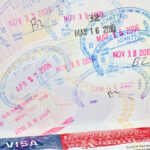Contents
It’s becoming a bit more difficult for U.S. employers to sponsor H-1B visas for international “specialty occupation” workers. Employers and their prospective foreign employees may need to consult a Las Vegas immigration attorney for the advice that applies in their specific situation.
In October of this year (2020), the U.S. Departments of Labor and Homeland Security each announced a new rule that will affect H-1B visas. The rule announced by the Department of Labor (DOL) became effective immediately upon its announcement (October 8).
The rule announced by the Department of Homeland Security (DHS) takes effect December 7, but it will not apply to H-1B petitions that are filed and pending before that date. The two new rules directly affect highly-skilled foreign workers and the U.S.-based employers that hire them.
However, several lawsuits have been filed that challenge the new rules, so it remains to be seen if the rules will be approved by the federal courts. If you’ll keep reading, you will learn the details of the new H-1B rules, and you’ll learn about the legal challenges to these rules.
What is the H-1B Visa?
The H-1B visa is a nonimmigrant work visa that allows U.S. employers to hire workers from other nations in specialty occupations. The H-1B is the most widely used U.S. work visa. USCIS (U.S. Citizenship and Immigration Services) issues 85,000 H-1B visas each year.
H-1B visas may be requested only by employers and not by their prospective employees. Scores of U.S. employers – in almost every sector of the economy – rely on H-1B visas, including Microsoft, Amazon, Google, and Facebook.
Since the number of H-1B applicants exceeds 85,000 each year, highly-skilled foreign workers are selected by USCIS in an annual lottery process. After strict scrutiny of each of the selected 85,000 applicants, USCIS approves or denies each visa request.
Can H-1B Visa Holders Seek Residency and Citizenship?
After receiving the H-1B visa, a worker may be sponsored by his or her employer as a lawful permanent resident (a green card holder), which allows that worker to remain permanently in the United States and eventually qualify for naturalized U.S. citizenship.
Ken Cuccinelli, Acting Director of USCIS, has said that under the new DHS and DOL rules, provided that the rules are upheld by the courts, as many as one in three H-1B visa applications will be rejected.
What is the New DHS Rule?
The new rule announced by the Department of Homeland Security narrows the definition of a “specialty occupation.” Under this rule, an H-1B candidate’s bachelor’s or master’s degree must be related directly to the specialty occupation position that the worker is applying for.
U.S.-based employers who accept too wide a range of degree fields may not meet the new specialty occupation requirement. Employers also must demonstrate that actual work is available at the time they submit their requests for H-1B visas.
The new DHS rule also compels employers to claim H-1B workers for tax purposes. Additionally, the new rule makes it easier for DHS to conduct jobsite enforcement and to remove H-1B authorization from employers who are not compliant.
What is the New DOL Rule?
The new rule announced by the Department of Labor raises prevailing wage levels, so it ultimately determines what H-1B workers will be paid. The DOL rule will raise the cost of hiring an H-1B worker, so some employers may no longer choose to sponsor H-1B workers.
The DOL determines the prevailing wage for various occupations in each part of the nation. The DOL has established four levels of prevailing wages based on job duties, education, and experience. The new DOL wage rule raises all four levels of prevailing wages.
How Will “Prevailing Wages” Increase Under the New DOL Rule?
In fact, the DOL’s new H-1B rule has increased the prevailing wage levels by nearly forty percent across the board.
What do these prevailing wage changes look like? Here are several examples:
- Under the old rule, the Level 1 prevailing wage for an electrical engineer in Pittsburgh was $66,976 annually. Under the new rule, that Level 1 wage is $92,851.
- Under the old rule, the Level 4 prevailing wage for an experienced software developer in Seattle was just above $155,000 annually. Under the new rule, that Level 4 wage is nearly $224,000.
The new DOL rule applies to any request for a prevailing wage determination that was pending on or after October 8, 2020. Although an employer may have submitted the request months back, if it was still pending on or after October 8, that request will be subject to the new wage levels.
Will the New Rules Be Approved by the Courts?
A number of U.S. corporations and universities have filed lawsuits to contest the new H-1B regulations. Those corporations and universities believe the new rules could force about 200,000 foreign-born scientists and other professionals to leave the U.S. when their current visas expire.
In the coming days and weeks, federal judges will hear the following challenges to the new H-1B rules:
- The U.S. Chamber of Commerce, the National Association of Manufacturers, the University of Southern California, and other parties have filed a lawsuit with the U.S. District Court for the Northern District of California against both of the new H-1B rules.
- Purdue University, the University of Michigan, and other parties including the Information Technology Industry Council have filed a lawsuit against the DOL’s new H-1B wage rule in the U.S. District Court for the District of Columbia.
- Another challenge to the DOL’s H-1B wage rule has been filed in the U.S. District Court for the District of New Jersey on behalf of ITServe Alliance, Precision Technologies, Smart Works, Zenith Services, and other U.S.-based high-tech employers.
Nothing in the new rules makes it easier for U.S. employers to hire specialized foreign workers. If both rules are approved by the courts and go into effect, employers who desperately need more workers may suffer and potentially slow the economy’s recovery after the COVID-19 pandemic.
Where Can You Turn for Reliable Immigration Advice?
If you are a specialized foreign worker who is already in the United States, if you want to work in the U.S., or if you’re a U.S. employer who hires specialized foreign workers, you should have the advice of a Las Vegas immigration lawyer who handles all aspects of immigration law.
In fact, if you are struggling with any immigration-related legal concern you should meet with an immigration attorney who can review your situation and work to resolve the matter in your favor and on your behalf.
As new immigration rules are proposed and implemented or rejected, millions of lives will be affected. Let the right Las Vegas immigration attorney provide you with the advice and legal services that immigrants, their families, and their employers will need.






